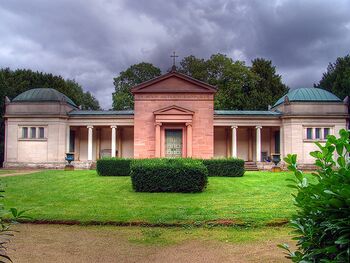Mausoleum: Difference between revisions
Jump to navigation
Jump to search

imported>Meg Taylor m (spelling: encorporate -> incorporate) |
mNo edit summary |
||
| Line 3: | Line 3: | ||
A '''Mausoleum''' (pl. Mausolea) is a freestanding building designed as a place to bury and memorialise the dead. The name is derived from the [[Tomb of Mausolus]] (died c. 353 b.c.), the [[Persia]]n King of [[Caria]] whose tomb was considered one of the [[Seven Wonders of the World]]. Mausolea may be either entirely above ground, or incorporate a significant underground 'crypt'; they may contain the remains of single individuals or groups and exist in many countries, faiths and cultures of the world. In some cases they are sealed. | A '''Mausoleum''' (pl. Mausolea) is a freestanding building designed as a place to bury and memorialise the dead. The name is derived from the [[Tomb of Mausolus]] (died c. 353 b.c.), the [[Persia]]n King of [[Caria]] whose tomb was considered one of the [[Seven Wonders of the World]]. Mausolea may be either entirely above ground, or incorporate a significant underground 'crypt'; they may contain the remains of single individuals or groups and exist in many countries, faiths and cultures of the world. In some cases they are sealed. | ||
==References== | ==References== | ||
<references/> | <references/>[[Category:Suggestion Bot Tag]] | ||
Latest revision as of 16:01, 16 September 2024
A Mausoleum (pl. Mausolea) is a freestanding building designed as a place to bury and memorialise the dead. The name is derived from the Tomb of Mausolus (died c. 353 b.c.), the Persian King of Caria whose tomb was considered one of the Seven Wonders of the World. Mausolea may be either entirely above ground, or incorporate a significant underground 'crypt'; they may contain the remains of single individuals or groups and exist in many countries, faiths and cultures of the world. In some cases they are sealed.
